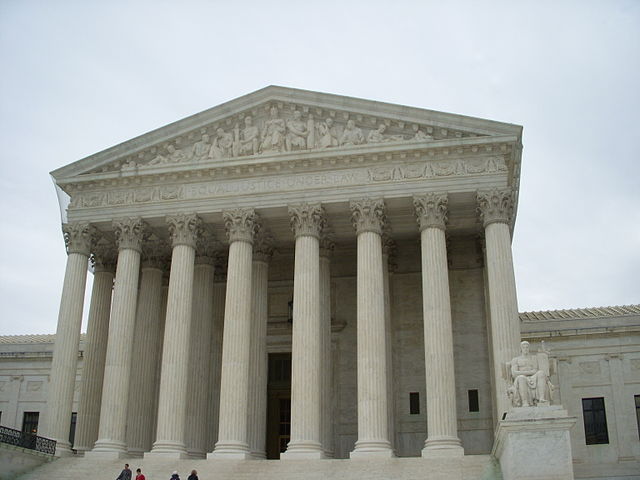|
Listen to this Article
|

In its analysis of Gentry’s continued “viability,” the Court first looked to its decision in Discover Bank v. Superior Court, 36 Cal.4th 148 (2005). In Discover Bank, the Court held that when they are likely to pertain to negligible damages and to be used as a means “to deliberately cheat large numbers of consumers” out of those damages, class arbitration waivers “are unconscionable under California law and should not be enforced.” 36 Cal.4th at 162-163. However, the U.S. Supreme Court’s ruling in Concepcion overruled Discover Bank by holding that “[r]equiring the availability of classwide arbitration interferes with fundamental attributes of arbitration and thus creates a scheme inconsistent with the FAA.” Concepcion, supra, 563 U.S. at ___. That is, the prohibition of such waivers is at odds with arbitration’s purpose of being expedient and affordable.
However, the Court seemed only to take note of those benefits as they pertain to employers. “Class arbitration also ‘greatly increases risks to defendants’ and ‘is poorly suited to the higher stakes of class litigation’ because of the lack of judicial review, ‘thus rendering arbitration unattractive’ to defendants.” Iskanian, supra (citing Concepcion, supra, 563 U.S. at ___).
The Court paid little mind to the interests of claimants in such matters before it proceeded to hold that Gentry, which held that class waivers were impermissible if “a class arbitration is likely to be more effective practical means of vindicating the right of the affected employees than individual litigation or arbitration,” was also no longer controlling. Gentry, supra, 42 Cal.4th at 463. Though decided more narrowly than Discover Bank’s broad presumption of unconscionability with respect to class action waivers, the Court held that Gentry was likewise preempted by the FAA under Concepcion. “The high court in Concepcion made clear that even if a state law rule against consumer class waivers were limited to ‘class proceedings [that] are necessary to prosecute small-dollar claims that might otherwise slip through the legal system,’ it would still be preempted.” Iskanian, supra (citing Concepcion, supra, 563 U.S. at ___). Why, you might ask? “[B]ecause states cannot require a procedure that interferes with fundamental attributes of arbitration ‘even if it is desirable for unrelated reasons.'” Id.
The Court similarly rejected Iskanian’s argument that such class action bans were at odds with the National Labor Relations Act (NLRA) per the National Labor Relations Board’s (NLRB) opinion in D.R. Horton, Inc. & Cuda, 357 NLRB No. 183 (2012) [2012 WL 36274], which argued that the NLRA prohibited such class action bans with respect to wage claims. Specifically, the Court agreed that under Concepcion, “even if a rule against class waivers applies equally to arbitration and nonarbitration agreements, it nonetheless interferes with fundamental attributes of arbitration and, for that reason disfavors arbitration in practice.” Iskanian, supra (citing Concepcion, supra, 563 U.S. at ___).
The Court did, however, manage to maintain that such waivers do not prohibit actions brought under California’s Private Attorney General Act (PAGA). “Simply put, the PAGA claim lies outside the FAA’s coverage because it is not a dispute between an employer and an employee arising out of their contractual relationship,” Justice Liu surmised. Iskanian, supra. Citing its decision in Arias v. Superior Court, 46 Cal.4th 969 (2009), the Court rejected CLS Transportation’s argument that PAGA actions were similarly banned by its class action waiver. Rather, the Court, suggested, PAGA actions are “a type of qui tam action.” Iskanian, supra. Looking to Civil Code Section 1668’s prohibition on contracts that seek to exempt their drafters from violations of the law and Civil Code Section 3513’s prohibition on contractual waivers of laws established for public purposes , the Court further recognized that such actions are unwaivable and thus not subject to a class action ban in an arbitration agreement. Id.
In her dissent, Justice Werdegar took issue with the preemption argument that pervades the majority’s opinion. She first noted that the FAA was passed in 1925 at a time during which courts were reluctant to recognize such arbitration agreements at all. Arguing that the FAA for the specific purpose of placing arbitration agreements “upon the same footing as other contracts” (H.R.Rep., No. 96, 68th Cong., 1st Sess., p.1 (1924)), Justice Werdegar suggested that the majority’s error was in entertaining and upholding “the notion that the FAA should be interpreted to operate as a super-statute, limiting the application of both past and future enactments in every particular.”
“Here, we deal with a provision-the waiver of the statutorily protected right to engage in collective action-that would be unenforceable in any contract, whether as part of an arbitration clause or otherwise,” she continued.
Justice Werdegar then pointed to the U.S. Supreme Court’s own observation that section 2 of the FAA makes clear “the purpose of Congress in 1925 was to make arbitration agreements as enforceable as other contracts, but not more so.” Prima Paint v. Flood & Conklin, 388 U.S. 395, 404 (1967). She proceeded to note Congress’s subsequent passage of the Norris-Laguardia and Wagner Acts. While the former served to outlaw employer’s use of contracts prohibiting collective employee action as a term of employment, the latter affirmatively recognized the employee right to engage in collective activity, which courts, including the U.S. Supreme Court, recognized to include collective legal action. See, e.g., Eastex, Inc. v. NLRB, 437 U.S. 556, 565-566 (1978).
“The Wagner Act thus prohibits, as an unfair labor practice, employer interference with the ability of current or former employees to join collectively in litigation,” Justice Werdegar concluded.
Noting the FAA’s own exception that arbitration agreements are invalid if “such grounds exist at law or in equity for the revocation of any contract” (9 U.S.C. section 2), Justice Werdegar made the simple yet powerful argument that the FAA is trumped by the plain language of the subsequently passed Norris-LaGuardia Act, which states that “[a]ll acts and parts of acts in conflict with this chapter are repealed.” 29 U.S.C. section 115. Taken in conjunction with the affirmative effect of the Norris-LaGuardia Acts, Justice Werdegar argued that the text, legislative history and judicial interpretation of these statutes serve “to render equally unenforceable contractual obligations to forswear collective action in regular employment agreements and in employment arbitration agreements.”
While the Court’s decision in Iskanian is likely to come as a major victory for employers who wish to insert class action waivers into their employment agreements, it is likely to come as a major blow to the employees who have no choice but accept such waivers if they wish to keep their jobs. In addition to the precarious position in which such a ruling places those statutory rights underscored in Justice Werdegar’s dissent, the Court’s efficiency rationale for upholding such waivers seems to grant little weight to those temporal and monetary concerns as they pertain to employees. Instead, the Court seems to have made keeping arbitration from becoming “unattractive” to employers a key priority, even if at the expense of an employee’s well-established right to collective action.




